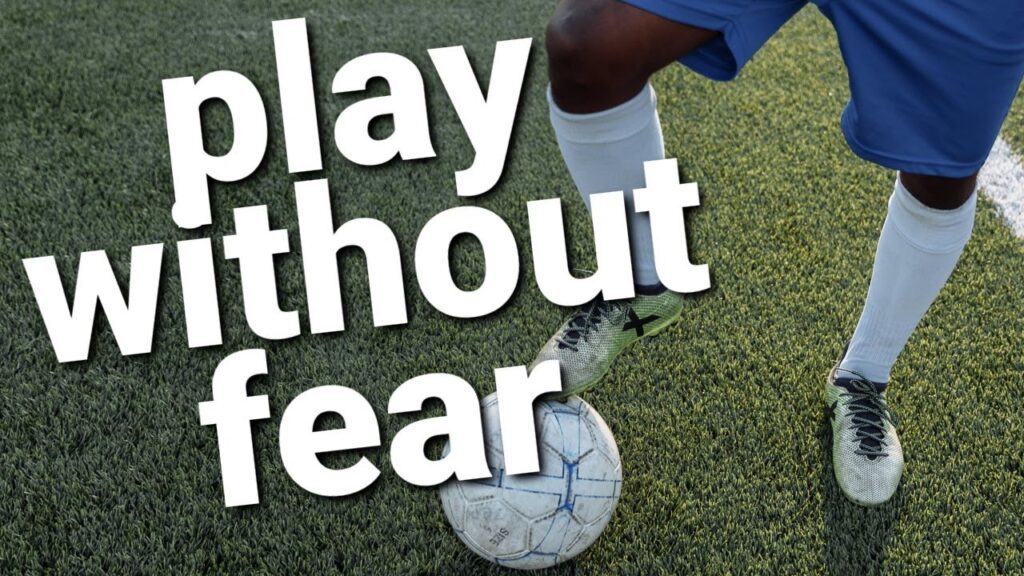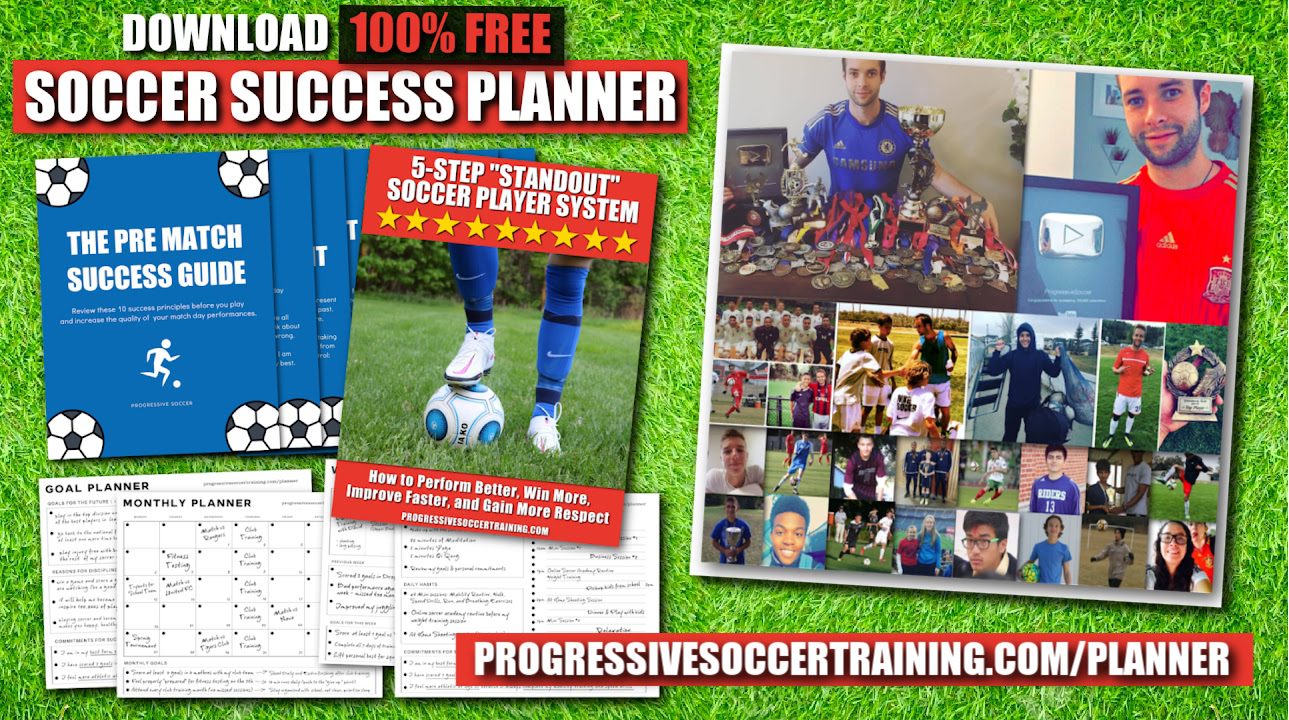How To Play Soccer Without Fear – Complete Guide (2025)
If you want to learn how to play soccer without fear – this is for you.
As a soccer player, it’s natural to experience moments of fear and uncertainty on the field. Whether you’re a beginner or a seasoned pro, fear can hinder your performance and prevent you from reaching your full potential.
However, with a few simple tips and tricks, you can learn how to play soccer without fear and become the confident and skilled player you’ve always wanted to be.

How To Play Soccer Without Fear
Playing without fear is crucial in soccer because fear can significantly impact a player’s performance and limit their potential. Fear can cause players to hesitate, second-guess themselves, and make mistakes on the field.
It can also reduce a player’s confidence, causing them to play more cautiously and conservatively. In contrast, playing without fear allows players to take risks, be more creative, and play with confidence and conviction.
Players who play without fear are more likely to trust their instincts, make bold moves, and take advantage of opportunities on the field.
In this video…
I will guide you through some helpful ideas on how to play soccer / football without fear.
How To Play Football Without Fear
How To Play Without Fear In Soccer
Here are some helpful tips to help you play soccer without fear:
- Practice, Practice, Practice
One of the best ways to overcome fear in soccer is through practice. The more you practice, the more confident you’ll become in your abilities, and the less afraid you’ll be of making mistakes. Set aside time each day to work on your soccer skills, whether it’s dribbling, passing, shooting, or tackling. With consistent practice, you’ll develop muscle memory and gain a better understanding of the game, which will help you feel more comfortable and confident on the field.
- Visualize Success
Visualization is a powerful tool for building confidence and reducing fear. Before a game or practice, take a few minutes to visualize yourself playing soccer with ease and confidence. Imagine yourself making successful passes, scoring goals, and making key defensive plays. Focus on the positive outcomes and visualize yourself succeeding, even in high-pressure situations. By practicing visualization regularly, you’ll train your mind to expect success, which will boost your confidence and help you play without fear.
- Focus on Your Strengths
It’s easy to get caught up in your weaknesses and shortcomings as a soccer player. However, if you want to play without fear, it’s important to focus on your strengths instead. Identify what you’re good at, whether it’s speed, agility, accuracy, or teamwork, and focus on honing those skills. By building on your strengths, you’ll feel more confident in your abilities and less afraid of making mistakes or failing.
- Embrace Failure
Fear often arises from a fear of failure or making mistakes. However, failure is a natural part of the learning process, and it’s essential for growth and improvement. Instead of fearing failure, embrace it as an opportunity to learn and grow. When you make a mistake on the field, take note of what happened and use it as a learning opportunity. By adopting a growth mindset and embracing failure, you’ll develop resilience and become a stronger and more confident player.
- Play with Passion and Purpose
Finally, one of the best ways to play without fear is to play with passion and purpose. Remember why you love soccer and what drives you to play. Whether it’s the thrill of competition, the joy of teamwork, or the satisfaction of improving your skills, tap into your passion and let it drive you forward. By playing with purpose and passion, you’ll feel more confident and motivated on the field, and you’ll be less likely to let fear hold you back.
Playing soccer without fear is possible with the right mindset and approach.
By practicing regularly, visualizing success, focusing on your strengths, embracing failure, and playing with passion and purpose, you can become a more confident and skilled player.

Common Fears In Soccer
In soccer, players often experience several common fears, many of which can have a significant impact on their performance. Understanding and addressing these fears is key to building confidence and playing at your best.
1. Fear of Making Mistakes
Fear of failure can be paralyzing, especially in high-pressure situations like penalty kicks or crucial moments during a match. This can manifest as hesitation, overthinking, or even freezing up on the ball.
How to overcome it: To manage the fear of making mistakes, embrace mistakes as opportunities for growth. Champions like Lionel Messi and Cristiano Ronaldo are known for their resilience in the face of errors—viewing setbacks as stepping stones rather than as roadblocks. Regular self-reflection and focusing on the positives of each training session or match will build confidence. Consistently practicing skills under pressure also helps desensitize the body to mistakes.
2. Fear of Embarrassment or Judgment
Many players worry about what teammates, opponents, or coaches think of them, especially when performing in front of a crowd. This fear is closely linked to self-esteem and the desire to prove oneself.
How to overcome it: Recognize that everyone experiences criticism and has bad games. The key is to internalize that mistakes are a natural part of growth. An effective mindset is focusing on improving and enjoying the game, rather than seeking approval. Building a strong internal sense of motivation helps neutralize the judgment of others. Additionally, practicing in front of others helps desensitize the fear of being watched or judged.
3. Fear of Injury
In a contact sport like soccer, the fear of injury is common, particularly for players who have experienced an injury before.
How to overcome it: Proper conditioning and strengthening exercises lower the risk of injury and reduce anxiety around it. Focus on building a strong, injury-resilient body through exercises like stretching, balance training, and stability work. Developing the mental resilience to trust your body’s capability and learn injury recovery techniques from previous experiences will also help overcome this fear.
4. Fear of Letting the Team Down
Some players may fear disappointing their team during crucial moments or failing to meet the expectations placed on them. This could be during a tight game or a specific defensive responsibility.
How to overcome it: Reframe this fear by thinking about your role as a part of the collective team effort. Supporting each other and focusing on team values over individual performance allows you to understand that soccer is a shared responsibility. The best way to relieve this pressure is through strong communication with teammates and coaches, reminding each player that the team succeeds and fails as a unit.
5. Fear of Facing Strong Opponents
Some players worry about going up against particularly skilled or intimidating opponents, which may affect their confidence during a game.
How to overcome it: Study your opponents to prepare and develop strategies for dealing with their strengths. Focus on your own abilities rather than their skills. Build confidence by remembering that every player, no matter how skilled, faces challenges during games. Constantly practice your strengths to help make the skills you’re good at part of your game against any opponent.
6. Fear of Being Subbed Out
A less commonly discussed fear is the anxiety that comes from being substituted off the field, often perceived as a loss of validation or importance in the game.
How to overcome it: Instead of fearing the substitution, reframe it as a chance for the coach to bring in fresh energy or strategically change the game. Embrace your contribution to the team, and use your time on the bench to observe the game and be ready when it’s your turn again. Remember that being subbed out doesn’t diminish your value, and everyone plays a role in the team’s success.
General Strategies to Overcome Soccer Fears:
- Visualization: Mentally rehearse successful plays or situations, helping reduce anxiety during real-life situations.
- Self-Talk: Practice positive affirmations and internal dialogue to shift focus from fear to confidence.
- Breathing Techniques: Calm your mind and body with slow, deep breaths, particularly in pressure-filled moments.
- Confidence Building through Consistency: Build confidence through constant practice, repetition of skills, and competing in various situations so that familiarizing yourself with fears can reduce their intensity.
By acknowledging these fears and addressing them with proactive strategies, players can begin to let go of self-doubt and perform at a higher level with confidence.

How To Not Be Scared Of The Ball In Soccer
If you’re afraid of getting hit by the ball in soccer, it’s a common fear that can be overcome with a mix of technique, mental preparation, and building trust in your body’s abilities.
Here are a few key strategies to help reduce this fear:
- Start Slow and Gradual Exposure: Begin by gradually increasing the intensity at which the ball comes toward you. Start with low-speed passes or juggling at close range, and then progress to more challenging situations. This helps your brain get used to the ball coming at you without the risk of injury.
- Wear the Right Protective Gear: In youth and amateur soccer, it’s often helpful to wear shin guards and padded jerseys when practicing. These will reduce the sting of an accidental hit and gradually build your comfort level around the ball.
- Mental Visualization: A huge part of overcoming fear is mental readiness. Visualize yourself successfully handling tough situations where the ball comes at you with force, and see yourself reacting confidently. This exercise helps prime the mind for positive outcomes.
- Increase Comfort with the Ball: Train with the ball in low-stress situations to develop more comfort. Juggling or passing against a wall (starting slow and building up speed) will increase your familiarity with the ball at all speeds. The more you handle the ball, the less you’ll flinch when it’s coming at you quickly.
- Take It One Step at a Time: Start by tackling smaller elements of the fear. For instance, if you’re scared of the ball hitting your face, you might first focus on blocking lower balls or perfecting your form when defending. Once those smaller steps are mastered, move on to more challenging scenarios with better confidence.
By applying these tips and keeping a patient mindset, you’ll learn to become less fearful and more agile on the field, allowing you to control situations more easily when the ball is coming at you quickly.

How To Play Soccer With No Fear
To play soccer without fear, you must shift your mindset from worrying about failure to embracing growth through experience. Understand that fear is natural, but it should never dominate your performance.
Start by focusing on your strengths, whether it’s your dribbling, passing, or vision on the field. Remind yourself of past successes to build your confidence.
Gradually expose yourself to situations that challenge you, and over time, your fear will diminish as your comfort with those situations grows. Incorporating mental strategies like positive affirmations and visualization can also help.
Visualize yourself playing without hesitation, handling the ball and tough situations with ease. Finally, embrace the love and passion you have for the game.
Focus on the enjoyment that soccer brings and not on potential mistakes. When you bring confidence, a growth mindset, and passion into your game, fear will no longer hold you back.

Common Questions
Here are some common questions related to how to play soccer without fear:
How do I stop being nervous when playing soccer?
To stop being nervous when playing soccer, it’s important to shift your focus from fear of mistakes to staying present in the moment. One effective way to manage nerves is through deep breathing exercises to calm your body. Visualizing success before the game, like recalling a time you made a great pass or tackled an opponent, can help shift your mindset to positivity. Another tip is to focus on preparation — the more ready you feel with your skills, fitness, and knowledge of the game, the more confident you’ll feel. Acknowledge that nerves are natural and can be channeled into motivation to perform your best.
How do I stop being shy in soccer?
To stop being shy in soccer, it’s crucial to start building confidence through smaller steps. Speak to your teammates and engage with them during practices to build relationships and reduce social pressure. On the field, focus on the task at hand and not how others might perceive your performance. Making mistakes is part of the process, and embracing that mindset will free you from fear. Consistently reminding yourself that everyone on the field is working toward the same goal—getting better—can take the weight off feeling like you’re under constant scrutiny.
How can I practice not being scared?
To practice not being scared, especially when facing difficult or intimidating moments, you must intentionally expose yourself to those situations in low-pressure environments. Practice repeatedly in situations that may make you feel nervous, like engaging in more physical duels or handling the ball in high-stress moments during training. Reflect on your thoughts during those times and practice reframing them positively. Gradually, as you see that you can overcome fear, you’ll grow accustomed to managing it on the field.
Why do I lack confidence in soccer?
Lack of confidence in soccer can stem from a variety of reasons such as self-doubt, past failures, or fear of judgment. These insecurities can grow if you focus too much on the negative, replaying mistakes instead of building on successes. It’s important to understand that confidence comes from progress and consistency. Instead of aiming for perfection, aim to continually improve one skill at a time. Your mental state plays a huge part in developing confidence—positive self-talk, affirmations, and working through fear or anxiety are essential.
Why do I hesitate in soccer?
Hesitation in soccer typically occurs when fear or uncertainty about making mistakes takes over. Often, players hesitate because they’re overthinking their next move or they don’t trust their own decision-making abilities. This can also happen due to the pressure to perform at a high level or fear of disappointing teammates and coaches. To combat hesitation, trust yourself and develop good habits through practice. The more consistent you are with ball control, decision-making, and awareness of your surroundings, the less time you’ll spend doubting yourself and the quicker your actions will become.
How do I get rid of anxiety in soccer?
Getting rid of anxiety in soccer starts with mindset shifts. Practice mental techniques, such as deep breathing and meditation, to relax your body and mind before a game. Developing a growth mindset, where you view mistakes as learning opportunities rather than failures, can reduce the pressure you place on yourself. Familiarity with the game through repetition and high-pressure training scenarios will also make you more resilient. Focus less on the result and more on enjoying the process and effort you put in every game. The more you embrace imperfections and focus on the joy of playing, the easier it is to reduce anxiety.

SOCCER PLAYERS
Want to become a better soccer player?
Watch this 3-minute video about discovering your true potential
Learn how to improve your skills, mindset, soccer IQ, and fitness—no matter your level. Start playing with confidence, earning respect, and impressing coaches today.
About Coach Dylan
I used to struggle with confidence in soccer, feeling slow, weak, and unmotivated. Coaches overlooked me, and friends made fun of my skills. At one point, I even quit.
But I decided to take control of my development. Through hard work, I transformed my game, earned league titles, awards, a college scholarship, and international caps.
Now, I share my lessons and help others improve through my YouTube channel (1/2 million subscribers), soccer coaching and personal training.

How To Play Soccer Better
Struggling to make progress in soccer or stay organized with your training?
The Soccer Success Planner will help you stay focused, motivated, and increase your chances of achieving your goals in soccer.
Success doesn’t happen accidentally. Use it to set clear goals, create a plan of action, and take control of your future. Learn more about the Soccer Success Planner.

How To Become A Better Soccer Player
Struggling to improve in soccer or unsure how to train effectively? Want to stand out and earn respect from teammates and coaches?
The Online Soccer Academy will get you better results in less time.
Thousands of players have already transformed their game in just 60 days. Learn more about how the online soccer academy.

Related Posts
Here are some related posts to help you gain more knowledge and helpful advice:
How To Become A Great Soccer Player
How To Improve First Touch In Soccer
Coach Dylan
Progressive Soccer
Thank you for reading this article:
How To Play Soccer Without Fear – Complete Guide (2025)
